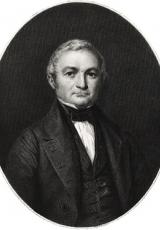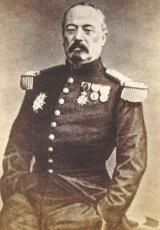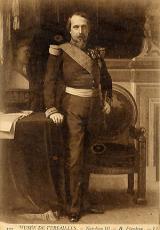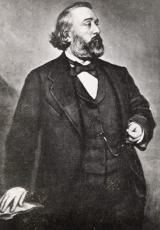Louis Faidherbe
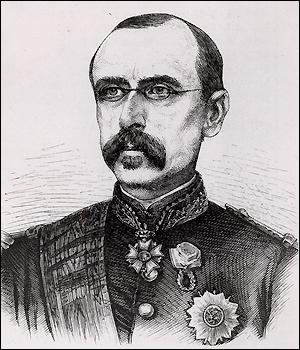
Source: SHD/Département Terre
(Lille, 3 June 1818-Paris, 28 September 1889)
Louis, Léon, César Faidherbe was the fifth child in a humble family of hosiers in Lille. Stubborn and hardworking, he entered the Ecole Polytechnique in 1838 and, later, the school of application in Metz. In 1842 he was named an officer in the corps of engineers and became acquainted with the colonies, staying for a brief while on the island of Guadeloupe in 1848 and in Algeria (1849), where he stood out by his organisational skills and physical and emotional toughness. Faidherbe, who opposed the coup d'Etat of 2 December 1851, went to Senegal in 1852. He rallied to the cause of traders hoping to profit from growing peanuts, cotton, etc. in a pacified territory and dismissed the sitting representative, Bouët-Willaumez (1808-1871). Now Borom N'Dar, gouvernor, he took advantage of tribal divisions to bring his plan of creating a homogeneous colony around the Senegal River to fruition. In 1854 Faidherbe unleashed his troops to conquer the principalities of Senegal, Bambouk and Foutou Toro, eventually defeating El-hadj's forces at the 1857 siege of Médine, a major episode in the "war of the Cross against the Crescent".
Faidherbe expanded France's possessions by annexing the kingdom of Walo and part of Cayor, and extending French control over Upper Senegal towards Bambouk. In the South he imposed the French protectorate on the kingdom of Sine-Saloum, La Petite Côte and Cap Vert Peninsula all the way to Casamance. During his stays in Senegal from 1852 to 1861 and 1863 to 1865 he organised the colony into arrondissements and circles commanded by officers from metropolitan France and set up a recruitment system among local populations that led to the creation of the first Tirailleurs Sénégalais battalion in 1857. Faidherbe, who met with criticism for his harsh military and political ways, implemented a policy of colonial expansion through railway lines and small forts. He established the teaching of French, fostered the advancement of local elites, founded the Banque du Sénégal in 1855 and built a port in Dakar.
Faidherbe expanded France's possessions by annexing the kingdom of Walo and part of Cayor, and extending French control over Upper Senegal towards Bambouk. In the South he imposed the French protectorate on the kingdom of Sine-Saloum, La Petite Côte and Cap Vert Peninsula all the way to Casamance. During his stays in Senegal from 1852 to 1861 and 1863 to 1865 he organised the colony into arrondissements and circles commanded by officers from metropolitan France and set up a recruitment system among local populations that led to the creation of the first Tirailleurs Sénégalais battalion in 1857. Faidherbe, who met with criticism for his harsh military and political ways, implemented a policy of colonial expansion through railway lines and small forts. He established the teaching of French, fostered the advancement of local elites, founded the Banque du Sénégal in 1855 and built a port in Dakar.
After a period of convalescence and imperial disgrace, Borom N'Dar lived in Algeria until 1870, where he promoted ethnological and archaeological research and endowed the Académie d'Hippone with a big library. In 1869 the Bey of Tunis gave him the ribbon of First Class Knight in the Order of Nichan al-Iftikhar. In Algeria Faidherbe closely followed news of the Franco-Prussian War, approving the emperor's capture at Sedan and Bazaine's capitulation at Metz (27 October 1870). He ended his silence, criticised Napoleon III's government and backed the patriotic Government of National Defence, which assigned him to the 22nd corps of the Army of Lille, Bourbaki's Army of the North, on 19 November 1870. Then Faidherbe went to Tours, where he met Gambetta before taking command of his division with the rank of major general on 4 December. He put up fierce resistance to Baron Manteuffel's troops along the Le Havre-Thionville front. With crafty tactics, and relying on a group of effective scouts, he drove the Prussians out of Rouen and harassed General Goeben near Amiens, his men getting the upper hand at Pont-Noyelle (23-24 December 1870), Péronne-Bapaume and Cambrai-Saint-Quentin in January 1871. His toughness, which led the enemy to nickname him "Dogtooth", helped loosen the Prussians' grip around Paris.
Faithful to the Republic, Faidherbe accepted the armistice and sent men to the Versaillais troops of Adolphe Thiers (1797-1877). He resigned his command to devote himself to the affairs of Lille, where he became mayor. Then Faidherbe published a series of studies on reorganising the army in which he advocated greater discipline for officers, the modernisation of firearms and compulsory two-year military service in order to educate the disadvantaged classes. Faidherbe was elected to parliament, where he participated in the major debates of the nascent Third Republic and chaired the Central Railway Committee. A man of letters, he studied and published the Libyan inscriptions of Egypt, visited Jerusalem (May 1872), etc. On 28 February 1880 Faidherbe became Grand Chancellor of the Legion of Honour, an institution he reformed. Declared a military officer for life in 1883, he joined General Boulanger, assisting his triumphs until dying on 29 September 1889. A national funeral took place on 2 October. A huge crowd and an official delegation from Senegal accompanied the cortege to the Invalides chapel. The next day his hometown, Lille, held a grandiose funeral. One homage followed another. The same year, the Senate commissioned a bust for the Luxembourg Gardens; in October 1891 the town of Bapaume unveiled a statue in his honour; Lille had an equestrian statue erected in 1896.
A sampling of Faidherbe's writings sums up the eventful life journey of this republican military officer, a member of the Academy of Inscriptions and Belles Lettres and the Geographic Society: Berbers and Arabs on the Banks of the Senegal (1854), Vocabulary of Around 1,500 French Words with their Matching Terms in Saint-Louis Wolof, Fouta Poular (Toucouleur) and Bakel Soninké (Sarrakholé) (1860), the chapter on the geography of northwest Africa in textbooks used in the schools of Senegambia (1865), Complete Collection of Numidian (Libyan) Inscriptions with a General Ethnographic Survey of the Numidians (1870), Phoenician Epigraphy (1871), The Army of the North's Campaign in 1870-1871 (1871), "Additional Note to the Committee Investigating the Operations of the Army of the North" (1873), The French Sudan. The Médine Railway Line in Niger (1881-1885), Senegalese Languages: Wolof, Arabic-Hassania, Soninké and Sévère (1887) as well as contributions to or interviews with L'Echo du Nord and Mémorial.


